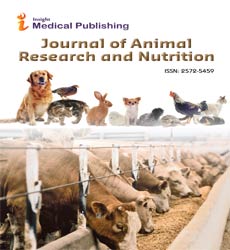The Role of Veterinary Science in Animal Health and Welfare
Moleiro Espinosa*
Department of Animal Breeding and Genetics, Federal University of Agriculture, Abeokuta, Nigeria
Moleiro Espinosa*
1Department of Animal Breeding and Genetics, Federal University of Agriculture, Abeokuta, Nigeria
- *Corresponding Author:
- Moleiro Espinosa,
Department of Animal Breeding and Genetics, Federal University of Agriculture, Abeokuta, Nigeria
E-mail: espinosa_m@gmail.com
Received date: September 24, 2024, Manuscript No. IPJARN-24-19748; Editor assigned date: September 26, 2024, PreQC No. IPJARN-24-19748 (PQ); Reviewed date: October 10, 2024, QC No. IPJARN-24-19748; Revised date: October 17, 2024, Manuscript No. IPJARN-24-19748 (R); Published date: October 24, 2024, DOI: 10.36648/2572-5459.9.5.144
Citation: Espinosa M (2024) The Role of Veterinary Science in Animal Health and Welfare. J Anim Res Nutr Vol.9 No.5: 144.
Description
Veterinary science is a branch of medical sciences, surround the diagnosis, treatment and prevention of diseases in animals. As our world grows more interconnected through agriculture, food production, environmental conservation and zoonotic diseases, the role of veterinary science has become increasingly critical for ensuring not only animal health but also public health and sustainable development. In this article, we describe the multidimensional importance of veterinary science, its key contributions to society and future challenges and opportunities in the field.
Animal health is at the heart of veterinary science. Veterinarians are responsible for diagnosing, treating and preventing diseases in animals, ensuring their well-being and promoting overall health. Whether dealing with livestock, companion animals or wildlife, veterinarians play a pivotal role in safeguarding animal welfare.
One of the primary concerns in veterinary science is zoonotic diseases-those transmitted between animals and humans. Recent events, such as the COVID-19 pandemic, have highlighted the critical need for veterinarians to be at the forefront of public health initiatives. Zoonotic diseases account for more than 60% of human infectious diseases and veterinarians are often the first line of defense in detecting and preventing outbreaks. Effective control of zoonoses relies on collaboration between veterinarians, medical professionals and policymakers.
The welfare of animals in various settings, including farms, zoos and laboratories, is another major focus. Veterinary science advocates for ethical treatment, proper nutrition and humane practices in animal husbandry. The field has been instrumental in pushing forward animal welfare legislation and ensuring animals are raised in conditions that meet their physiological and behavioral needs.
Veterinary science and livestock management
Veterinary science is need for the health and productivity of livestock, which forms the backbone of food security and economic stability for many communities around the world. The management of livestock health directly impacts the efficiency of meat, milk, wool and other animal products. Healthy livestock ensures a steady food supply, improves nutrition and supports economic livelihoods in rural areas.
Veterinarians contribute to livestock management by improving reproductive efficiency, controlling diseases that can decimate entire herds and advising on animal feed and nutrition to optimize growth and production. The importance of veterinary services is particularly evident in developing countries, where livestock diseases can have devastating economic consequences. The ability of veterinarians to diagnose and manage disease outbreaks in livestock, implement vaccination programs and educate farmers on best practices has a direct impact on improving food security and reducing poverty.
Veterinary science also plays an important role in addressing global challenges such as Antimicrobial Resistance (AMR). The overuse of antibiotics in livestock production is a growing concern, as it contributes to the development of resistant bacteria that can affect both animals and humans. Veterinarians are at the forefront of promoting responsible antibiotic use and developing alternative strategies for disease prevention and treatment, such as vaccinations and biosecurity measures. This is vital to protecting animal health and ensuring that effective treatments remain available for both animals and humans.
Animal health and food safety
Beyond animal health and welfare, veterinary science has significant implications for public health. Veterinarians are key contributors to food safety, ensuring that the food supply chain, from farm to fork, is free of contaminants that could cause illness. They are involved in inspecting slaughterhouses, testing for pathogens in meat and dairy products and enforcing regulations that prevent the spread of diseases through food products.
Food safety is critical in preventing outbreaks of foodborne illnesses, such as salmonella or E. coli, which can have severe consequences for public health. Veterinarians play a vital role in monitoring and controlling these diseases, especially in intensive farming systems where animals are often raised in close quarters. Proper veterinary care and hygiene management help ensure that animal products reaching consumers are safe and of high quality. Furthermore, veterinarians contribute to managing the environmental impacts of animal agriculture. Sustainable livestock management practices, such as reducing greenhouse gas emissions from livestock and implementing waste management systems, are important aspects of their work.
Veterinarians are involved in developing and promoting sustainable agricultural practices that balance the need for animal production with environmental conservation.

Open Access Journals
- Aquaculture & Veterinary Science
- Chemistry & Chemical Sciences
- Clinical Sciences
- Engineering
- General Science
- Genetics & Molecular Biology
- Health Care & Nursing
- Immunology & Microbiology
- Materials Science
- Mathematics & Physics
- Medical Sciences
- Neurology & Psychiatry
- Oncology & Cancer Science
- Pharmaceutical Sciences
